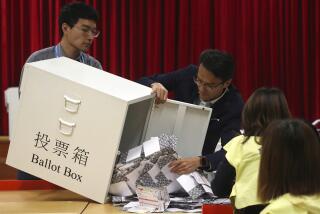China to Define Hong Kong Reform Limits
- Share via
HONG KONG — A sense of growing anxiety gripped Hong Kong on Friday as a key panel of the National People’s Congress in mainland China convened to decide the future of democratic reform in the territory.
Beijing’s decision, expected by Tuesday from the standing committee of China’s parliament, is seen as an attempt to define the limits of an intense, yearlong political debate in Hong Kong about broadening universal suffrage in the quasi-autonomous territory.
It also will serve as a blunt reminder to all involved that no liberalization of voting rights can succeed without Beijing’s blessing, political analysts noted.
These analysts speculate that the committee can rule in any number of ways, possibly limiting its advice to a set of relatively loose guidelines to ensure an orderly reform with Beijing’s consultation, or perhaps imposing arduous conditions that would take years to fulfill.
Either way, the mainland’s decision to intervene directly has drawn angry responses from reform advocates.
Emotions boiled over briefly early Friday when scuffles broke out between police and a small group of democracy supporters outside the Hong Kong government’s central office complex.
The confrontation was minor. Two police officers were slightly injured and two protesters were detained, then released, as authorities removed about 20 demonstrators who had broken into the office grounds, then camped there all night in hopes of handing in a petition to protest Beijing’s intervention.
The group earlier had attended a candlelight vigil by about 3,000 protesters who had gathered in the territory’s central commercial district.
But for Hong Kong, which saw half a million people parade through the streets without incident last July in the territory’s largest anti-government demonstration and then witnessed a second peaceful march of 100,000 on New Year’s Day, it was an unsettling example of heightened political tensions.
Later Friday, about 30 elected district councilors delivered a similar petition to a senior police official outside the same government offices.
“We urge the people’s government [in Beijing] to hear the voice of the Hong Kong people,” said Richard Tsoi, a protest leader.
Beijing’s abrupt announcement March 26 that it would intervene directly in the controversy stunned those pushing to expand democracy in the region to include election of the territory’s next chief executive by direct popular vote in 2007 and the entire 60-member Legislative Council the following year. The current chief executive, Tung Chee-hwa, was selected by a small group of the territory’s elites in consultation with Beijing.
This is only the second time that Beijing has taken such a step since Hong Kong returned to Chinese sovereignty nearly seven years ago.
In a 1999 decision, the same committee of the National People’s Congress overturned a Hong Kong court judgment that would have liberalized immigration rules, but on that occasion, the committee acted reluctantly and at the request of the territory’s government.
Under a formula known as “one country, two systems,” Hong Kong enjoys considerable autonomy and has a mini-constitution called the Basic Law, which - ensures basic democratic rights such as free speech.
Hong Kong democrats insist that the broadening of suffrage rights is well within any objective reading of the Basic Law and that Beijing’s intervention constitutes a serious blow to the territory’s autonomy.
Having a political body interpret a constitutional issue also undermines Hong Kong’s rule of law, democracy advocates argue.
“Even a benign interpretation puts Hong Kong at risk,” said Margaret Ng, a lawyer who is among those pushing the hardest for reforms.
However, pro-government parties in the territory support the intervention, stating that it will provide clarity for an important debate.
Beijing initially tried to sidetrack the debate, first by turning it into amorphous discussions on what it called the “principles” behind the Basic Law, then by questioning the patriotism of those pushing for greater democracy.
But, apparently unnerved by several recent events, including the chaotic presidential election in Taiwan, Beijing suspended the debate and declared its intention to issue its own decision.
Taiwan’s voters last month gave a narrow endorsement to Chen Shui-bian, a leader openly opposed to Beijing’s dream of eventually reuniting the island with the Chinese mainland. China considers Taiwan a renegade province.
Analysts believe that China’s leaders want to ensure that Hong Kong will not be able to put a chief executive in office who is opposed to Beijing.
More to Read
Sign up for Essential California
The most important California stories and recommendations in your inbox every morning.
You may occasionally receive promotional content from the Los Angeles Times.













